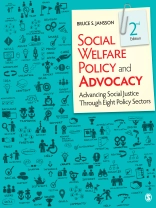Social Welfare Policy and Advocacy presents a multi-level framework to show students how micro, mezzo, and macro policy advocacy can be used effectively by social workers in eight policy sectors: healthcare, gerontology, safety-net, child and family, mental health, education, immigration, and criminal justice. Author Bruce S. Jansson identifies seven core problems within each sector and discusses the skills social workers need, the challenges they face, and the interventions they can use at each level of advocacy. Readers will gain knowledge of social welfare policy issues and be equipped with essential tools for engaging in policy advocacy.
Spis treści
Preface
Acknowledgments
A Brief Bio-Sketch of Bruce S. Jansson
1. Becoming a Policy Advocate in Eight Policy Sectors
Learning Objectives
Engage Social Welfare Policy Whether You Are Micro or Macro
Conceptualizing Policy Practice
Understanding How a Multilevel Policy Advocacy Framework Was Developed
Linking the Multilevel Advocacy Framework to Eight Policy Sectors
Using This Book as a Road Map for Your Student and Professional Career
Contrasting Micro Policy Advocacy With Clinical Practice
Understanding How the NASW Code of Ethics Requires Use of Micro, Mezzo, and Macro Policy Advocacy
Using Policy Advocacy to Help Vulnerable Populations
Analyzing a Multilevel Policy Advocacy Framework
Providing Policy Advocacy at Three Levels
Linking Three Levels of Advocacy for Pregnant Teens and Teen Mothers
Developing Micro Policy Advocacy Red Flag Alerts
Developing Red Flag Alerts at Three Levels
Learning Outcomes
References
2. Advancing Social Justice With Seven Core Problems
Learning Objectives
Defining Social Policies
Defining Social Justice
Core Problem 1: Advancing Ethical Rights, Human Rights, and Economic Justice
Core Problem 2: Improving the Quality of Social Programs
Core Problem 3: Making Social Programs and Policies More Culturally Responsive
Core Problem 4: Developing Preventive Strategies to Decrease Social Problems
Core Problem 5: Improving Affordability and Access to Social Programs
Core Problem 6: Increasing the Scope and Effectiveness of Mental Health Programs
Core Problem 7: Making Social Programs More Relevant to Households and Communities
Recognizing the Seven Core Problems in the Eight Policy Sectors
Joining the Reform Tradition of Social Work
Learning Outcomes
References
3. How Policy Advocates Advanced Social Justice Through American History
Learning Objectives
The Colonial Period
The Gilded Age
The Progressive Period
The Great Depression
The Great Society
Nixon’s Surprise
Conservative Counterrevolutions
Preparing for a New Reform Period
Learning Outcomes
References
4. Providing Micro Policy Advocacy Interventions
Learning Objectives
Defining Micro Policy Advocacy
Reading the Context
Challenge 1: Deciding Whether to Proceed
Challenge 2: Deciding Where to Focus
Challenge 3: Obtaining Recognition That a Client Has an Important, Unresolved Problem
Challenge 4: Analyzing or Diagnosing Why a Client Has an Unresolved Problem
Challenge 5: Developing a Strategy to Address a Client’s Unresolved Problem
Challenges 6, 7, and 8: Implementing and Assessing Micro Policy Starategy
Measuring and Predicting Micro Policy Advocacy of Specific Frontline Professionals
Learn How a Social Worker Engaged in Micro Policy Advocacy
Learning Outcomes
References
5. Practicing Mezzo Policy Advocacy Interventions
Learning Objectives
Defining Mezzo Policy Advocacy
Identifying Five Skills Needed for Mezzo Policy Advocacy
A Preliminary Challenge: Reading the Context of Agencies and Communities
Challenge 1: Deciding Whether to Proceed
Challenge 2: Deciding Where to Focus
Challenge 3: Obtaining Decision Makers’ Recognition of Unresolved Problems
Challenge 4: Analyzing Why the Problem Exists
Challenge 5: Developing a Strategy or Proposal to Address the Problem
Challenge 6: Developing Support for a Strategy or Proposal
Challenge 7: Implementing a Strategy or Policy to Address the Problem in Agencies and Communities
Challenge 8: Assessing Whether the Implemented Strategy or Policy Was Effective in Agencies and Communities
A Case Example of Mezzo Policy Advocacy
Measuring Skills Needed for Mezzo Policy Practice
Learning Outcomes
References
6. Engaging in Macro Policy Advocacy
Learning Objectives
Understand the Context of Public Policies
How Macro Policy Advocates Engage the Eight Challenges
Identifying Macro Policy Advocacy Skills
Facilitating Macro Policy Practice Among Frontline Health Professionals
Learning Outcomes
References
7. Becoming Policy Advocates in the Health Care Sector
Learning Objectives
Developing an Empowering Perspective Toward Persons With Unaddressed Health Problems
Analyzing the Evolution of the American Health Care System
Identifying Health Problems Caused by Economic Inequality
Analyzing the Political Economy of the American Health System
Analyzing the Seven Core Problems
Thinking Big as Advocates in the Health Care Sector
Learning Outcomes
References
8. Becoming Policy Advocates in the Gerontology Sector
Learning Objectives
Developing an Empowering Perspective Toward Seniors
Analyzing Problems of Seniors Caused by Economic Inequality
Analyzing the Political Economy of the Gerontology Sector
Analyzing Seven Core Problems in the Gerontology Sector
Thinking Big as Policy Advocates in the Gerontology Sector
Learning Outcomes
References
9. Becoming Policy Advocates in the Safety Net Sector
Learning Objectives
Developing an Empowering Perspective Toward Persons Who Need Safety Net Programs
Analyzing the Evolution of the American Safety Net System
Analyzing How Defects in American Safety Net Programs Often Exacerbate Income Inequality
Analyzing the Political Economy of the Safety Net Sector
Using American Safety Net Programs to Improve Consumers’ Well-Being
Job-Related Programs
Nutrition-Enhancing Programs
Shelter-Enhancing Programs
Asset-Creating Programs
Home Ownership Programs
Individual Development Accounts (IDAs)
Understanding How Seven Core Problems Exist in the Safety Net Sector
Thinking Big as Policy Advocates in the Safety Net Sector
Learning Outcomes
References
10. Practicing Policy Advocacy in the Mental Health and Substance Abuse Sector
Learning Objectives
Developing an Empowering Perspective About Mental Health and Substance Abuse
Analyzing the Impact of Income Inequality on Mental Health and Substance Abuse
Analyzing the Political Economy of Mental Health and Substance Abuse
Analyzing the Evolution of the Mental Health and Substance Abuse Sectors
Addressing Seven Core Problems in the Mental Health Sector With Advocacy
Thinking Big as Policy Advocates in the Mental Health and Substance Abuse Sector
Learning Outcomes
References
11. Becoming Policy Advocates in the Child and Family Sector
Learning Objectives
Developing an Empowering Perspective with Respect to the Child and Family Sector
Understanding the Current State of Children
Strengthening Families by Meeting Basic Needs
Understanding the Journey of Children Through the Child Welfare System
Analyzing the Quest for Algorithms to Predict the Odds that Specific Children Will Be Harmed
Analyzing the Challenges of Emancipation
Analyzing the Evolution of the Child and Family Sector
Understanding the Scope of Child Abuse and Neglect
Understanding the Political Economy of the Child and Family Sector
Recognizing Child and Family Problems That Are Created By an Inegalitarian Nation
Understanding How Seven Core Problems Exist in the Child Welfare Sector
Thinking Big as Policy Advocates in the Child and Family Sector
Learning Outcomes
References
12. Becoming Policy Advocates in the Education Sector
Learning Objectives
Developing an Empowering Perspective With Respect to Education
Analyzing the Evolution of the American Education System
Recognizing Education Problems That Are Created By And Cause an Inegalitarian Nation
Analyzing the Political Economy of the Education Sector
Analyzing Seven Core Problems in the American Education System
Thinking Big as Policy Advocates in the Education Sector
Discussion Questions
Learning Outcomes
References
13. Becoming Policy Advocates in the Immigration Sector
Learning Objectives
Developing an Empowering Perspective With Respect to Immigrants
Analyzing the Evolution of America’s Immigration Policies
Analyzing the Movement of Persons Across National Boundaries
Analyzing the Legal Status of Immigrants in the United States
Recognizing Problems for Immigrants Created by Extreme Inequality
Understanding the Political Economy of the Immigration Sector
Back to Values and Data
Analyzing Seven Core Problems in the Immigration Sector
Thinking Big as Policy Advocates in the Immigration Sector
Discussion Questions
Learning Outcomes
References
14. Becoming Policy Advocates in the Criminal Justice Sector
Learning Objectives
Developing an Empowering Perspective about Criminal Justice
Analyzing the Evolution of the American Criminal Justice Sector
Identifying Connections between Mass Incarceration and Economic Inequality
Analyzing the Political Economy of the Criminal Justice Sector
Analyzing Seven Core Problems in the Criminal Justice Sector
Thinking Big as Policy Advocates in the Criminal Justice Sector
Learning Outcomes
References
Index
O autorze
Bruce S. Jansson (MA, University of Chicago and Harvard University; Ph D, University of Chicago) is the Driscoll/Clevenger professor of social policy in the School of Social Work at the University of Southern California (USC). He joined the USC faculty in 1973 after working in Michigan as a community organizer and planner for tenant rights. He also has served as the Moses distinguished research professor at the City University of New York (CUNY) Graduate Center. His scholarly interests focus on advancing case advocacy and policy advocacy in social work, as well as examining the history and practice of social welfare policy. He invented the term “policy practice” in the 1984 release of The Theory and Practice of Social Policy, which was succeeded by other titles, including Becoming an Effective Policy Advocate (1999, 2003, 2008, 2011, and 2014). Policy practice has since emerged as a recognized intervention, with the Council on Social Work Education now requiring social work schools to teach policy practice.












